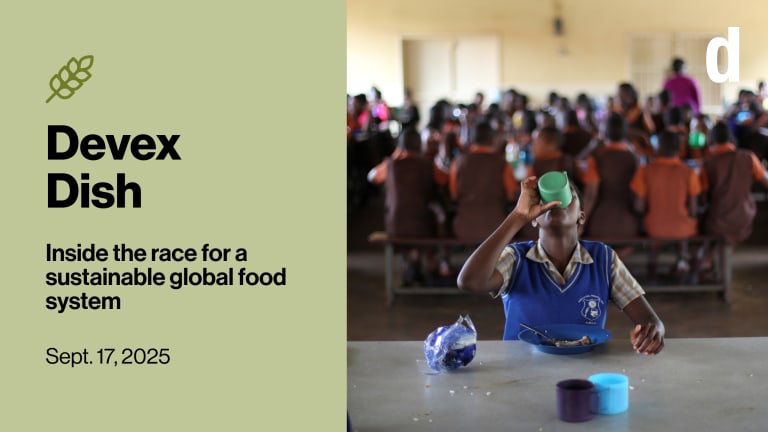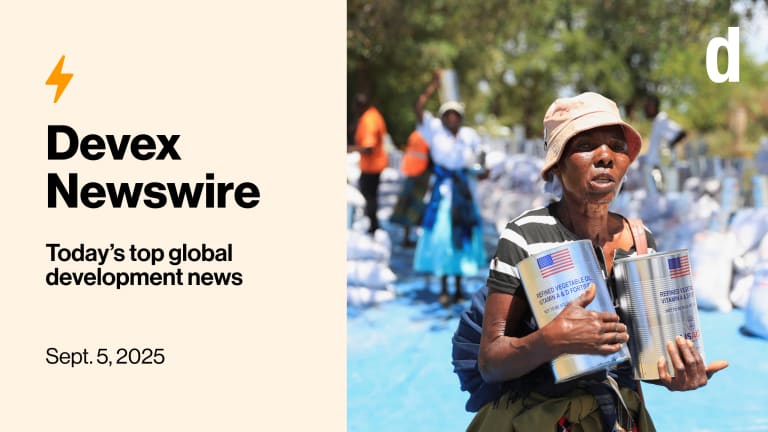Mali shows impact of proposed cuts to US-funded school lunch programs

MOPTI, Mali — When midday strikes the village of Soufoulaye, hundreds of elementary school children flood the front yard, their open-air cafeteria, in preparation for lunch. First, the students crowd two hand washing buckets, one with soap and one to rinse. Then, the 500 students organize themselves into small clusters. Parents serving as cafeteria volunteers bring large, silver bowls filled with rice and fish to each group.
Scenes like this provide school lunches for up to 72,000 Malian children daily. Parents and community members say Soufoulaye’s program, funded by the United States McGovern-Dole International Food for Education and Child Nutrition Program, or FFE, are responsible for raising school attendance, improving nutrition and boosting girls’ access to education.
Under the proposed 2018 federal budget of President Donald Trump, however, the FFE program could be eliminated. The “America First” blueprint budget released in March cites concerns that school lunch schemes lack evidence of “being effectively implemented to reduce food insecurity.”
Stay up to date on Devex coverage of U.S. foreign policy under Trump:
► Tips for navigating the 'new Washington'
► Opinion: Federal budget claims support for evidence, but slashes funding for it
► Mapping Republican views on aid as budget discussions kick off in Congress
► Trump expands 'global gag rule,' targeting $8.8B in global health aid
Beneficiaries in Mali, however argue that not only has this school feeding program improved student health and their learning capacity, but it has also offered economic relief and social stability to local populations.
“We cannot name all the ways this program has helped our community, because education is the foundation of life,” said Brenna Arama, president of the parent-teachers’ association in neighboring Sirakoro, a village whose school kitchen is also supported by the FFE program. “Having an education allows our children to build the community, build the country and help gives them a vision,” she said.
Current FFE programs in Mali are financed through 2020, when government and local programs are expected to assume the responsibility for maintaining school kitchens. But the experience here underscores what communities across the globe could stand to lose if schoolchildren can no longer rely on a U.S.-funded daily meal.
Community support
FFE-supported initiatives in Mali have found widespread community support, parents said during a recent meeting attended by Devex.
School lunch programs have improved student hygiene practices and established a heightened sense of camaraderie, one woman told Devex during the meeting.
“This program has also created a savings for families ... because we don’t have to spend as much on food at home because we know they have eaten good rations and were well fed at school,” another mother said.
Niek de Goeij, country director at Catholic Relief Services, which implements FFE programs at 262 schools across Mali, said the program has helped address the challenge of educating girls.
“The schools we support have actually seen girls attending more and longer than boys, because parents are really happy that they can send a girl to school and that they can come and get a healthy, nutritious meal and learn,” he said. Girls account for 310 of the 522 students in Soufoulaye, for example.
Some of those gains could be reversed if funding is halted, Goeij warned. “The very basic premise of children having access to a nutritious meal grown by farmers in the U.S. to have the energy to actually learn at school, I think that would be a tremendous loss for the world,” he said.
Avoiding mass hunger
The FFE program was launched in 2003 by President George W. Bush under the U.S. Department of Agriculture, with the bipartisan support of Sen. George McGovern and Sen. Bob Dole. It spends about $200 million a year in support of school lunch programs in hunger-prone developing countries and aims to help reduce hunger, improve literacy and primary education, especially in girls.
For some families in Mali, a school lunch is the only guaranteed substantive meal some children will eat all day. Recent harvests have been limited due to sporadic rains, leaving many homes with limited food supplies.
As the number of hunger emergencies increase worldwide, school lunches can play a critical role in avoiding child hunger, analysts argue.
“School meals is one of our best food aid tools for countries suffering from conflict, drought and poverty; it’s been this way for years,” William Lambers, author of the book Ending World Hunger wrote in a recent op-ed.
Improving livelihoods
Having school kitchens in the country’s Mopti region has helped students, who walk as far as four miles each day to school, maintain the energy they need to focus in class and make the journey back home, community members told Devex.
“Attendance rates are up. We see people come from five kilometers, and before they would return home at lunch because they can’t sustain and must walk back,” explained Sirakoro elementary school director, Roland Duoyon.
Funding for school lunch programs across Mali has diminished in the past few years, with cuts to programs led by the World Food Programme, the World Bank and the Analysis Programme of CONFEMEN Education Systems — a specialized group within the Conference of Ministers of Education for Francophone States and Governments that supervises national education systems. Last year, when WFP suspended its school feeding about 180,000 children at 1,000 schools were impacted. Until now, FFE-sponsored programs have been one of the most robust remaining funding sources.
Editor’s note: Catholic Relief Services facilitated Devex's travel and logistics for this reporting. However, Devex maintains full editorial control of the content.
Stay tuned to Devex for more news and analysis of what the Trump administration means for global development. Read more coverage here and subscribe to The Development Newswire.
Search for articles
Most Read
- 1
- 2
- 3
- 4
- 5








